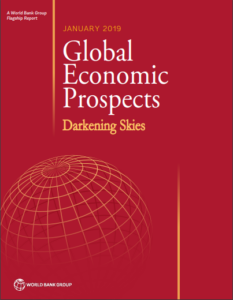According to the World Bank, the January 2019 edition ‘Darkening Skies’ focuses on the economic growth that has weakened, the trade tensions remain high, several developing economies have experienced financial stress, and risks to the outlook have increased. As the report stresses, emerging market and developing economies, EMDEs, face great challenges but are expected to remain flat in 2019.
Global economic growth is projected to soften from a downwardly revised 3 % in 2018 to 2.9 % in 2019 amid rising downside risks to the outlook according to the World Bank.
Specifically, moderating activity and heightened risks are affecting global economic prospects. International trade and investment have softened, trade tensions remain elevated, and some large emerging market and developing economies (EMDEs) have experienced substantial financial market pressures.
[smlsubform prepend=”GET THE SAFETY4SEA IN YOUR INBOX!” showname=false emailtxt=”” emailholder=”Enter your email address” showsubmit=true submittxt=”Submit” jsthanks=false thankyou=”Thank you for subscribing to our mailing list”]
On the contrary to the above challenges, EMDE rise has stalled, with a sharply weaker-than-expected recovery in commodity exporters accompanied by a deceleration in commodity importers.
According to the report, in order to manage this increasingly difficult environment, the most urgent priority is for EMDE policymakers to prepare for possible bouts of financial market stress and rebuild macroeconomic policy buffers as appropriate.
Additionally, policymakers need to foster stronger potential growth by boosting human capital, removing barriers to investments, and promoting trade integration within a rules-based multilateral system. Such efforts would also help address the challenges associated with informality.
Government debt levels among low-income countries have increased from debt-to-GDP ratios of 30 % to 50 % over the last four years. Low income countries are using an increasing proportion of government revenues to make interest payments. Such debt service pressures will only grow further if borrowing costs rise as expected in the following years.
The climate change and the frequent weather events increase the possibility of variations when it comes to food prices, which could result to poverty. World Bank, in order to prevent poverty, supports a shift in policy emphasis away from trade policies.
Authorities have in the past intervened with trade measures to dampen the effect of fluctuations in the prices of key food commodities, including rice, wheat and maize.
While food prices have decreased since peaks at the turn of the decade, world hunger and food insecurity have risen between 2014 and 2017. The number of under-nourished people experienced an increase by 5% to 821 million during that period, and food security challenges have recently been recognized as an urgent priority by the G20.
Further, food price spikes of the kind experienced in 2010-11 could occur again as extreme weather events raise the possibility of disruption to food production.
Concluding, World Bank Group Vice President for Equitable Growth, Finance and Institutions, Ceyla Pazarbasioglu stated that
Robust economic growth is essential to reducing poverty and boosting shared prosperity.
For more information, see the PDF herebelow:































































